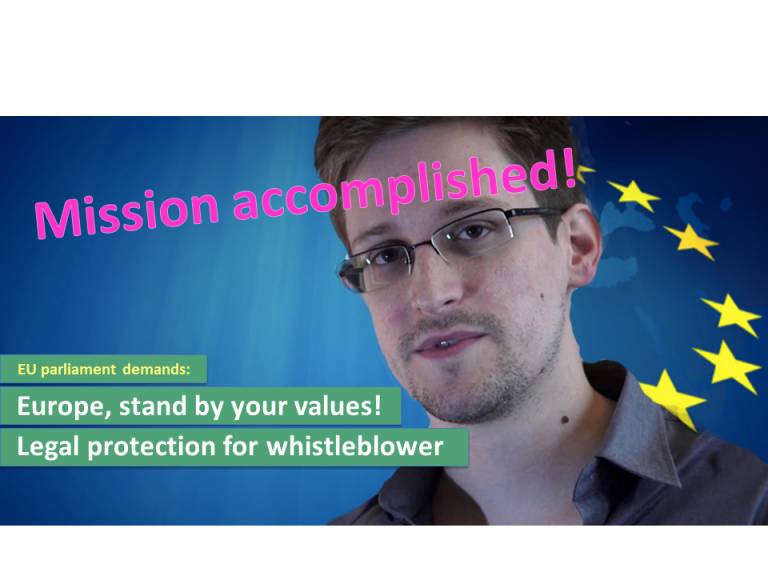An agreement on European whistleblower protection has just been reached midnight in the trialogue between the European Parliament, Commission and Council. Many years of Green campaigning for the protection of whistleblowers end in success. The German and French governments had tried for a long time to block this agreement. It was intense public criticism that led to German justice minister Katarina Barley’s change of mind.
MEP Sven Giegold, the European Parliament’s rapporteur for transparency, accountability and integrity in the EU institutions and spokesman for Bündnis 90/Die Grünen in the European Parliament, Sven Giegold, said:
“This is a breakthrough for the protection of whistleblowers. Whistleblowers will get the protection they deserve in Europe in the future. Media freedom will be strengthened through secure rules for whistleblowers. Courageous action for the common good must enjoy the best possible legal protection. Many whistleblowers want to defend the law, so they should also be protected by the law. With today’s decision, our years of fighting for whistleblowers are bearing fruit. We Greens have urged the EU Commission to introduce a whistleblower protection law. At the latest the case around the LuxLeaks Whistleblower showed, how fast the wrong ones can end up as accused in court. In future the new rule in Europe will be: Those who want to protect the common good will get the best possible protection from the community. It is useful for climate, health and justice to protect those from repression who report when law is broken.
It is important that whistleblower protection is not conditioned on the use of internal company reporting channels. Internal reporting channels can become a danger for whistleblowers. Strong protection of whistleblowers outside the company’s own structures strengthens the watchdog role of the media.
BACKGROUND
After a long-fought battle between the European Parliament and EU governments, whistleblowers would be protected for reporting internally or for reporting directly to regulators and competent authorities. Several European governments wanted to make the reporting process as strict as possible so that whistleblowers would only be protected if they reported internally first, unless they could fulfil one of the unclear exceptions that would “justify” reporting to regulators. Achieving flexibility on this point was crucial for the European Parliament to be able to agree on the final draft of the whistleblower Directive.
When it comes to public reporting, whistleblowers would be protected if they reported directly to regulators or if they reported internally and externally but no appropriate action was taken in response to the report within three months for internal reporting or three to six months in the case of reporting to regulators. They’d also be protected if they had reasonable grounds to believe that there is an imminent or manifest danger for the public interest, such as where there is a situation of emergency or a risk of irreversible damage.
Finally, whistleblowers would also be protected for reporting to the public if, in the case of reporting to regulators, there is a risk of retaliation or there is a low prospect of the breach being effectively addressed, due to the particular circumstances of the case, for example, where evidence may be concealed or destroyed or where an authority is somehow involved in the breach.
Almost 3 years ago we Greens in the European Parliament raised pressure for EU-wide protection standards with our own draft whistleblower protection law. Almost a year ago, the Commission reacted with its official proposal. Since the Council had finally agreed on a position at the end of January, the European Parliament, the Commission and the Council hold intense negotiations to reach tonight’s agreement in the trialogue.
Until days before the agreement, the Council insisted on whistleblowers’ obligation to report first to their own company or authority (first stage), before they can turn to an external supervisory authority (second stage) and only then to the press or the public (third stage). Whistleblowers should therefore wait 3 to 6 months each for feedback in the first and second stage before they could rely on European legal protection for public reporting after one year (three-tier reporting system). This procedure is unreasonable for many whistleblowers. From the outset, Parliament wanted to guarantee legal certainty for whistleblowers, regardless of whether they raised an internal alarm or applied directly to a supervisory authority (two-tier reporting system). Already after 2 to 4 months whistleblowers can sound the alarm publicly with guaranteed legal protection.
EU Commission’s proposal for a Directive on the Protection of Whistleblowers (23 April 2018): https://eur-lex.europa.eu/legal-content/DE/TXT/HTML/?uri=CELEX:52018PC0218
—–
Details of the JURI vote for Parliament’s position (20 November 2018): https://sven-giegold.de/major-progress-for-whistleblower-rights-and-protection/
—-
Green Draft Whistleblower Directive (4 May 2016): https://www.greens-efa.eu/en/article/whistle-blowers-directive/

